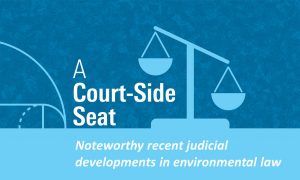
The last few weeks have yielded a number of interesting developments in the Federal courts.
FEDERAL COURTS OF APPEAL
In re Flint Water Cases
Several local and State of Michigan officials, including the former governor, requested dismissal from the civil litigation seeking damages for the massive failure of Flint, Michigan’s public drinking water system. On August 5, 2020, the U.S. Court of Appeals for the Sixth Circuit agreed that the plaintiffs, residents of Flint, have successfully pled a case that the conduct of the defendants so “shocked the conscience” that a claim for a violation of their substantive due process rights was appropriately alleged. The defendants, including the former governor, argued that they were entitled to a qualified immunity defense. The court rejected this argument on the basis of the earlier decisions made by the court in this matter. Judge Sutton concurred because he was bound by this precedent, but remarked that the evidence for the governor’s culpability was very thin; he was not intimately connected to the extraordinary error in judgment. The majority was very upset with this concurrence as indicted by their own opinion.
Continue Reading ›
 In episode 17 of Industry Insights podcast, host Joel Simon and Christian Salaman discussed the changes the hotel and hospitality industry are undergoing.
In episode 17 of Industry Insights podcast, host Joel Simon and Christian Salaman discussed the changes the hotel and hospitality industry are undergoing.





